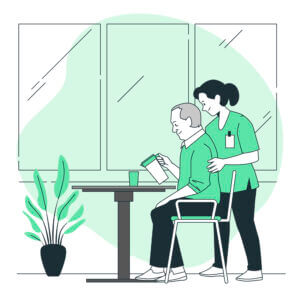How to Cope with the Loss of a Loved One in Home Health Care
Losing a loved one is an incredibly challenging and emotional experience, and it can be even more complex when it occurs within the context of home health care. The deep emotional connections forged during the caregiving process can make the loss feel particularly profound. In this blog post, we will explore the unique aspects of coping with the loss of a loved one in home health care and provide guidance on finding the support and strength to navigate this difficult journey.

Understanding the Uniqueness of Loss in Home Health Care
Home health care creates an intimate setting for caregiving, where the lines between professional care and personal relationships often blur. The individuals providing care in the home become more than just caregivers; they become trusted companions, offering not just medical support but also emotional comfort and companionship.
Coping with Home Health Care Grief and Loss
1. Acknowledging Your Feelings:
The first step in coping with the loss of a loved one in home health care is to acknowledge your feelings. Grief is a complex and individualized process. Whether you’re a family member or a caregiver, it’s essential to recognize that your grief is valid.
2. Seeking Home Health Care Bereavement Support:
Many home health care agencies offer bereavement support services. These services provide a safe space for you to share your emotions and experiences with others who understand the unique challenges of caregiving. Reach out to your home health care provider to inquire about available support groups or counseling services.
3. Creating a Tribute:
Honoring your loved one’s memory can be a healing process. Consider creating a tribute or memorial in their honor. This could be a scrapbook, a memorial service, or even a charitable donation to a cause they cared deeply about.
4. External Support Systems:
Don’t hesitate to seek external support systems, such as professional grief counseling or therapy. A trained therapist can provide valuable tools and strategies to help you navigate your grief effectively.
The Role of Home Health Care Providers
Home health care providers play a significant role in helping families cope with the loss of a loved one. They often develop close relationships with both the patient and their families, and their support doesn’t end with the passing of their patient. These providers can offer guidance on the grieving process, and they can refer families to bereavement support services.
If you or your loved one received care from Applied Home Health Network, our compassionate team is here to support you through the grieving process. Our bereavement support services are tailored to meet your unique needs during this challenging time.
Additionally, you may find valuable resources and support from organizations like the National Hospice and Palliative Care Organization that specialize in grief and bereavement support.
Conclusion
Coping with the loss of a loved one in home health care is a deeply personal journey, but you don’t have to go through it alone. Reach out to your home health care provider for support, connect with others who understand your experience, and remember that seeking professional guidance is a sign of strength, not weakness. Together, we can navigate this challenging path and find healing and hope amidst the pain.
In times of loss, let the memories of your loved one guide you toward a brighter tomorrow.
We Are Social On:

Recent Comments